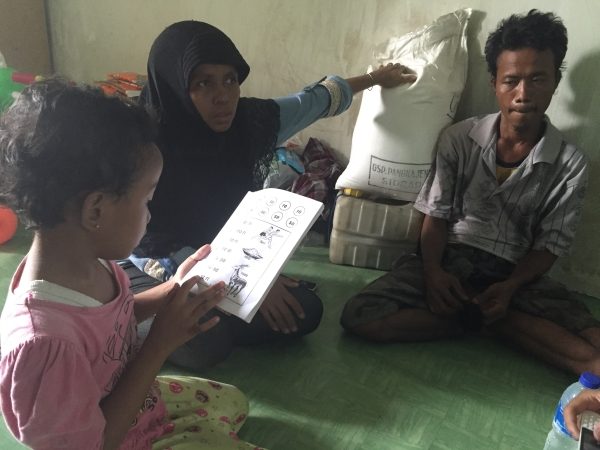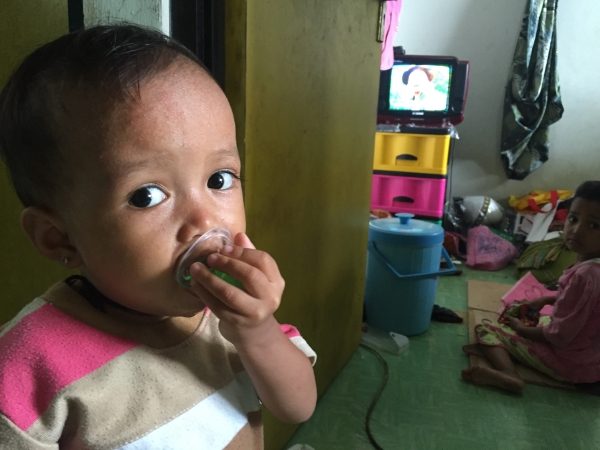SUMMARY
This is AI generated summarization, which may have errors. For context, always refer to the full article.

This compilation was migrated from our archives
Visit the archived version to read the full article.
JAKARTA, Indonesia – It was a scorching hot day when Rappler met Muhammad Soleh.
Soleh was on his way home waiting for a bus in the terminal with his mother Sa’hara, who is 76 years old. She has lived in Pasar Ikan for 70 years.
From the terminal, it took nearly 1.5 hours to arrive in their new home, the low-cost apartment Rusunawa Marunda, from their old home at the fish market or Pasar Ikan in North Jakarta.
Soleh and his mother were among the hundreds evicted from Pasar Ikan by the Jakarta city administration on Monday, April 11, to “revitalize” the city’s north coast.
The government wants to turn the cleared area into a fish-trading center and create a maritime-themed historical public space to attract tourists. According to Jakarta Governor Basuki Tjahaja Purnama, the city administration will install sheetpile as part of a sea wall in Muara Baru near Pasar Ikan in May to block high waves.
The authorities prepared low-cost apartments for the residents to move into but many of them resisted the relocation and refused to leave the place they have called home for years. The buildings however were all flattened.
According to the city administration, 321 Pasar Ikan families have registered for places in the low-cost apartments after their houses were demolished.
Soleh was among those forced to move.
Lost
Soleh lives with his mother, wife and two daughters on the second floor of the apartment. It’s a unit without decor, with two bedrooms, a living room, bathroom, and a small terrace.
The family says they were quiet and happy when they were in Pasar Ikan, but they faced a big change last week.
“I have lived in Pasar Ikan since I was a girl. And I used to work as a cleaner there, but now I don’t know what to do,” Sa’hara told Rappler on Friday, April 15.

“I find cans and bottles near my home, it’s a 10-minute walk,” Sa’hara explained, saying that she cannot do it now since the fish market is far away.Sa’hara worked as a janitor in the fish market when she was young. After she retired, she earned a little money by collecting cans and bottles to help her son.
‘So fast’
Soleh said they understand they needed to move, but said he hoped it would’ve been to better conditions.
“I have heard that they might demolish our house and heard about the relocation plan for a long time, but I didn’t know it would come so fast,” Soleh said.
Before his house was demolished, they had moved to the apartment at Rusunawa Marunda, which he said was smaller than where they lived in Pasar Ikan.
“We have lived here for nearly one week, everything is settling down but what I need now is a job to pay the rent and living expenses,” Siti Laela, Muhammad Soleh’s wife said.
She was a fish cleaner in Pasar Ikan but has now lost her job. “We cannot afford the rent, it’s too expensive,” she said.
Although the residents in the apartments are allowed to stay for free for the first 3 months, after that, they are required to pay Rp 151,000 ($11.4) per month, excluding electricity and water supplement.
The city government has provided housing, but no jobs, employment options, nor basic skills training for the hundreds relocated.
The family says they hope the government could help them find new ways to make a living.
New life?
Soleh, who worked in Pasar Ikan as a labor worker, was also forced to look for another job after the demolition of Pasar Ikan. Fortunately, he found a job as a helper for fisherman in a fish market near Old Town Jakarta – about 29km away.
It is a long distance from their apartment to any public transportation terminal.
“It takes us more than 2 hours from Terminal Tanjung Priok to the apartment,” Soleh said.
Although the free buses were provided by Jakarta administration for the residents in the area, Soleh said it does not come very frequently. He added that he had to transfer 3 times by TransJakarta, minibus and angkot (public minivan) to the fish market.
He added that he had to transfer 3 times by TransJakarta, minibus and angkot (public minivan) to the fish market.
“It’s too far,” he said.
He explained that his salary is hardly enough to cover for transportation, let alone to pay the rent. If he can’t find a second job, this family will have to find another place to stay.
But where? “I don’t know,” Soleh said. “I don’t know.” – Rappler.com
Add a comment
How does this make you feel?
There are no comments yet. Add your comment to start the conversation.